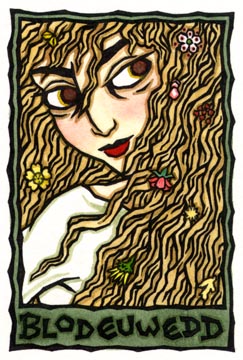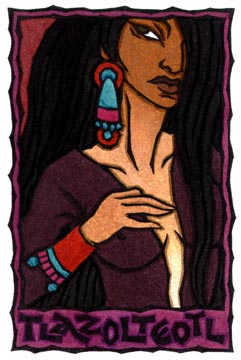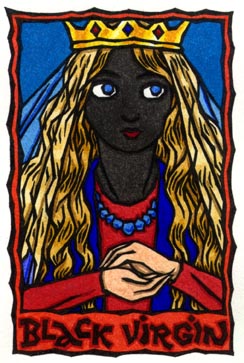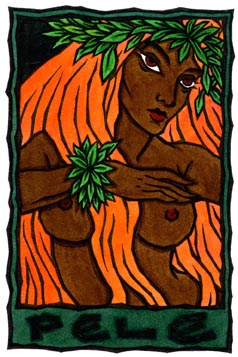
Blodeuwedd has come up twice before; once for the last week of November and then again the first week of December.
Blodeuwedd is a Welsh Goddess Whose name means "Flower Face," and in The Mabinogion, which dates from medieval times, She is said to have been created by two magicians from the blossoms of the oak, broom, and meadowsweet, to be the wife of Lleu Llaw Gyffes, Who was cursed by His mother Arianrhod to never have a wife from any race of the earth. Lleu (don't ask me to pronounce that) is connected with the Irish Lug Lámfhota as well as the Gaulish God Lugos; He is probably originally a God of the sun or of light, as lug in Old Irish means "light" or "brightness."
It is not surprising, I suppose, that the sun or light should be connected with flowers in myth; after all the growing light and heat of springtime is what causes the whole shebang, at least in the temperate regions. And it makes sense that Blodeuwedd and Lleu, flowers and light, should show up in the week that includes Beltaine, that merry festival of union and blossoming.
But something about Blodeuwedd's story bothered me. The springtime element is only a part of it. For She is also an owl Goddess, connected with autumn and dying; and Her story does not end happily.
Not long into the marriage of Blodeuwedd and Lleu, it happened that Lleu was away for a time. While He was away, a hunter by the name of Gronw Pebyr came by, and since it was late in the day and he was far from home, Blodeuwedd invited him to stay the night in the castle, in accordance with the customs of the time. But at the feast it was quickly obvious to both of them that it was love at first sight; and in bed that night they contemplated their situation. It was Gronw's assertion that for them to be together Lleu had to die; and he convinced Blodeuwedd to find out how Lleu could be killed, as special protections had been placed on Him by the magicians.
So She did, and a year later Gronw gored Lleu with a magical spear, in odd and predestined circumstances; and Lleu, grievously injured, changed into an eagle and flew away. He was eventually found by the magicians and restored both to human form and good health.
For Her part in it, Blodeuwedd was punished by being transformed into an owl; and Gronw was killed by Lleu.
Rereading Her legend this time, I was struck by how the blame for Lleu's death always falls squarely on Blodeuwedd. Even though She was not the one to throw the spear. Even though it was not Her idea. Even though Lleu didn't actually die.
She gets more blame than Gronw does, Gronw who spent a good year of Sundays crafting that spear with ill intent, Gronw of the strong arm and sure aim. In The Mabinogion Gwydion (one of the magicians who created Her, and let me tell you, no favorite of mine) tells Her that for Her part in the plot 'I will not slay thee. I will do to thee that which is worse; that is I will let thee go in the form of a bird.' Whereas Gronw, though he is killed, is allowed the mercy of holding a stone between himself and Lleu's spear, since 'it was through a woman's wiles that I did to thee that which I did.' It doesn't help, of course; Lleu is so strong that the spear goes right through the stone and into Gronw, killing him.
(Incidentally, all of Blodeuwedd's maidens are killed as well, though it is not always mentioned--they are driven off a high cliff into a lake, where they drown. Gronw's men are not similarly punished.)
Now, the argument can be made that Blodeuwedd is the force behind all this, as She is really an old Goddess of transformation, of spring and autumn and the changing year, disguised as a princess in a medieval fairy-tale; and I wouldn't disagree with that. She is Maiden and Crone both. And I suppose I really shouldn't be surprised that a medieval version of a myth would place the blame on the woman; I mean they were working under the influence of Christianity and its foundation myth of Eve. I get that. (Though The Mabinogion does have more than a few outspoken and intelligent women in it--Rhiannon and Arianrhod for starters.) But in all the retellings I've seen it is always said that Lleu is 'killed' by Gronw's spear, even though he obviously wasn't; even in my own quick retelling on my web site, written some years ago, I use the word.
Because the blame always falls harder, and the punishment is always harsher, for women in this society. And it is taken as normal, such that people who are supposed to be aware (and I include myself) don't even see it.
Sure, this week is Beltaine, and the beginning of May and flowers and all that happy stuff (and don't get me wrong, May is my absolute favorite month, and Beltaine my absolute favorite holiday); so it is entirely appropriate that a Goddess made from flowers should show up. But I think the deeper message this week is about that misplaced blame. We women have internalized it for so long.
But to weed it out of ourselves we have to be able to see it first; and I don't know what kind of advice can be given to help that. If we don't see it, we can't see it, you know? But I think we have to try. Maybe take a situation from your past, one where you blamed yourself, and try looking at it with fresh eyes. How has the expectation of blame affected what you believe? What part of the blame have you taken? What part does not actually belong to you?
This is properly Blodeuwedd's realm, after all, as She is both owl-Goddess Who sees in the dark as well as Goddess of springtime's rebirth; and it is inevitable that one runs into the other--that one causes the other.
Well, after all that blathering on my part, what does She say?
White the blank sheet
White the snow
White the hawthorn
White the bones
It is my nature to be both. It is the Earth's nature to be both; it is not betrayal. It is both day and night; both together make a whole. It is simply the seasons. One after the other, each to the other. Remember spring here is autumn there, as the Earth is a whole, a circle, a globe; and opposites are always present at the same time.
If you can get your head around that, you'll be getting somewhere. For Earth as well as for yourself.
What do you think?
Quotes from the Gwyn and Thomas Jones translation of The Mabinogion.







